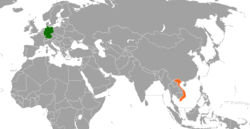Germany–Vietnam relations
This article has multiple issues. Please help improve it or discuss these issues on the talk page. (Learn how and when to remove these template messages)
|
 | |
Germany |
Vietnam |
|---|---|
Germany–Vietnam relations are the bilateral relations between Germany and Vietnam.
Germany has an embassy in Hanoi while Vietnam has an embassy in Berlin and a consulate general in Frankfurt.
History
World War I
During the first 6 months of
The two largest pre-war import/export houses, Speidel & Co. and F. Engler & Co., were German companies which caused them to be officially re-organised as
2017 kidnapping of Trịnh Xuân Thanh
In 2017,
Agreements
In October 2011, German Chancellor Angela Merkel and Vietnamese Prime Minister Nguyễn Tấn Dũng signed the "Hanoi Declaration", establishing a Strategic Partnership between Germany and Vietnam that is designed to strengthen political, economic and cultural relations and development cooperation.[6]
Economic relations
Vietnam is in the process of ratifying a free trade agreement with the European Union which includes Germany as Europe's largest economy. In 2016, bilateral trade was worth US$10.3 billion.[6]
Education cooperation
The Vietnamese-German University was opened in Ho Chi Minh City in September 2008.[6]
Diplomatic representatives
Vietnamese ambassadors to Germany
- South Vietnam ambassadors to West Germany (in Bonn)
- Hà Vĩnh Phương (1957–1963, Chargé d'affaires)
- Phan Văn Thính (1963–1964, Chargé d'affaires)
- Nguyễn Quí Anh (1964–1968)
- Nguyễn Duy Liễn (1968–1974)
- Nguyễn Phương Thiệp (1974–1975, until the Fall of Saigon)
See also
References
- ^ Deutsch-Französische Gymnasium, among others). Retrieved 21 August 2022. - Peters, Erica J.: Food and Nutrition (Indochina), in: 1914-1918-online. International Encyclopedia of the First World War, ed. by Ute Daniel, Peter Gatrell, Oliver Janz, Heather Jones, Jennifer Keene, Alan Kramer, and Bill Nasson, issued by Freie Universität Berlin, Berlin(2014-10-08). DOI: 10.15463/ie1418.10321.
- ^ Centre des Archives d’Outre-Mer in Aix-en-Provence (hereafter CAOM): Archives of the Governor General of Indochina (hereafter GGI), dossier 19457: 20 November 1914 letter from Governor General Vollenhoven to the Minister of Colonies.
- ^ Tanriverdi, Hakan; Zierer, Max; Wetter, Ann-Kathrin; Biermann, Kai; Nguyen, Thi Do (October 8, 2020). Nierle, Verena; Schöffel, Robert; Wreschniok, Lisa (eds.). "Lined up in the sights of Vietnamese hackers". Bayerischer Rundfunk.
Ex-politician and businessman Trinh Xuan Thanh was strolling through the park Berliner Tiergarten with his girlfriend when presumably agents of the Vietnamese secret service jumped out of a van and dragged the two inside. With the kidnapping on German grounds, they not only broke international law but also the arm of Thanh's lover. [...] The price for this operation was probably very high, both financially and diplomatically. The relations between Vietnam and Germany were suspended.
- ^ "Germany expels Vietnam diplomat after kidnapping". Financial Times. 2017-08-02. Retrieved 2023-04-06.
- ^ "Kidnapped? Vietnamese businessman disapears [sic] from Berlin – DW – 08/02/2017". dw.com. Retrieved 2023-04-06.
- ^ a b c "Federal Foreign Office".


